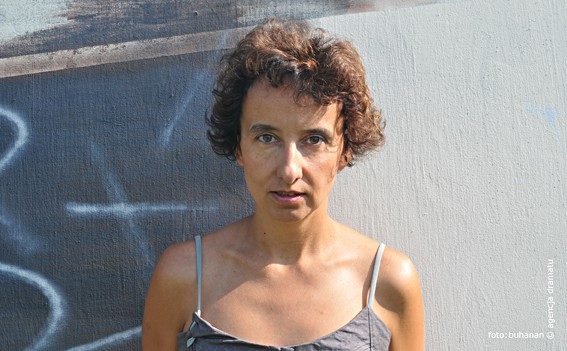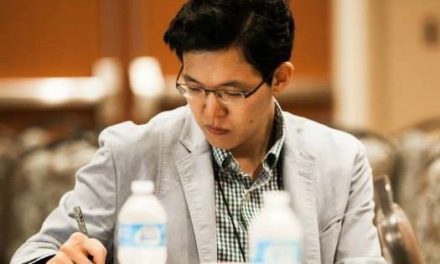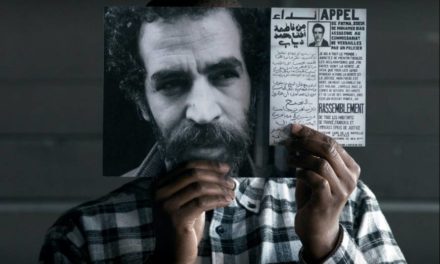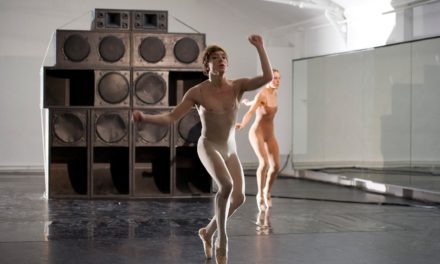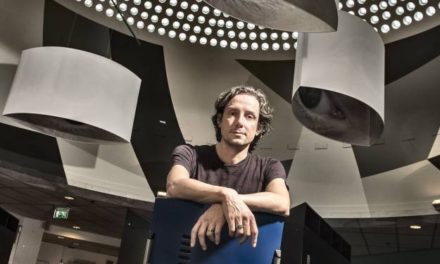In this section, we introduce Polish artists, places, and new phenomena. We always ask the person or the place’s representative the following question: WHY ARE YOU HERE? How they interpret the question and answer it is completely up to them: Małgorzata Sikorska-Miszczuk.
Małgorzata Sikorska-Miszczuk (1964)―considered to be among the most interesting contemporary playwrights and screenwriters. She graduated from the Department of Journalism and Political Science at the University of Warsaw, where she also earned a degree in gender studies. She is also a graduate of the scriptwriting program at the Łódź Film School. Author of numerous short stories, plays, radio dramas, and screenplays for film and television. She debuted in 2004 with the drama Psychoterapia Dla Psów I Kobiet [Psychotherapy For Dogs And Women], part of a project by Teatr Rozmaitości in Warsaw.
She is the author of such plays as Szajba (Loose Screws), Śmierć Człowieka-Wiewiórki [The Death Of The Squirrel Man], Katarzyna Medycejska [Catherine Medici], Zaginiona Czechosłowacja [Lost Czechoslovakia], Burmistrz [The Mayor], Walizka [Suitcase], Żelazna Kurtyna [Iron Curtain], Madonna, Bruno Schulz: Mesjasz [Bruno Schulz: Messiah], and a musical for children titled Niezwykła Podróż Pana Wieszaka [The Incredible Journey Of Mr. Coathanger] (dir. Iwo Verdral, 2009).
Her plays have been staged by Jan Klata (Loose Screws, The Death Of The Squirrel Man―a radio drama), Piotr Kruszczyński (Suitcase), Marcin Liber (The Death of the Squirrel Man, Catherine Medici―God, Honor, Fatherland), Natalia Korczakowska (The Death Of The Squirrel Man), Nina Gühlstorff (The End Of The World―Theater Magdeburg), Michał Zadara (Bruno Schulz: Messiah―Schauspeilhaus Wien), Karel Kral (Lost Czechoslovakia― Divadlo na Zábradli, Prague).
The Death Of The Squirrel Man, directed by Marcin Libera, was staged in Germany at the Kampnagel theatre in Hamburg during the Transfusion 2007 festival, in Berlin at the Hebbel am Ufer theatre in Berlin during the second edition of the Cut and Paste Festival of Young European Theatre, at the New Plays from Europe festival―the Theatre-Biennale of the Staatstheater Wiesbaden (2008), and in Bucharest (2008). Her plays have been read in Poland, Sweden, and in the US: in New York, New Haven, and Minneapolis.
Jan Klata’s production of Loose Screws won the Journalists’ Award and took second place at the R@port Festival of Contemporary Polish Plays in Gdynia in 2009. Suitcase won the Metaphors of Reality competition at Poznań’s Teatr Polski: the play was awarded the Main Prize and the Audience Award in September 2008. A radio drama directed by Julia Werno was created for Polish Radio on October 2, 2008, and was awarded the Grand Prix at the Polish Radio and Television Festival Two Theatres―Sopot 2009. The pre-premiere of Suitcase, directed by Piotr Kruszczyński, was held at Teatr Polski in Poznań. The production won a distinction at the 4th R@port Festival in Gdynia (May 2009).
Madonna won 1st prize at the J. Szaniawski Theatre in Wałbrzych for drama inspired by Aleksander Fredro’s Revenge (November 2009). April 2010 marked the premiere of The End Of The World, commissioned by Theater Magdeburg (Germany) and which opened at the OstOstOst–20 Jahre Westen festival, directed by Nina Gühlstorff and translated by Andreas Volk.
Bruno Schulz: Messiah, directed by Michał Zadara, premiered in Vienna in October 2010 at Schauspeilhaus Wien and was invited to perform in Poland at R@port 2010.
Sikorska-Miszczuk’s plays have been translated and performed all over Europe and the USA. The playwright received scholarships from the Ministry of Culture, the US CEC ArtsLink foundation (October–November in the USA), and the Adam Mickiewicz Institute (May 2010). She worked alongside Marcin Liber as a playwright for the multimedia project Herbert–Reconstructing The Poet (2008), ID (2009), and the oratorio Our Hell (2010). Many of her plays have been published in the theatrical magazine Dialog, and several have been translated into German, English, French, and Romanian.
QUOTES:
“(…) I’ve always wondered whether audiences find my work attractive enough. I’m used to wringing out every last drop of myself, no quarter (…)”
“(…) I’m interested in the topic of women’s liberation and the turbulence between the sexes that results. I call it depressive feminism. Whenever I think about it, I get depressed, because we’re living in hard times for both sexes. Men also have a hard time finding their place in relation to women, who want to be liberated.”
“(…) the world can be treated as a mirror of sorts, making all its stories about ourselves. Even if my plays take place in 16th century France, for example, or in the 70s in Czechoslovakia, for me they remain deeply entangled in some Polish issue.”
“I disagree vehemently with that total, unhindered aggression that does not respect the boundaries of other people. These boundaries are being transgressed continuously and with impunity, in both the physical and mental sense. People can’t even drive past each other on the street without exchanging profanities.”
“Sikorska-Miszczuk is my favorite living author. Her little body holds the Aurora of wit and irony, ready to fire on the 17th of every month. Her great intellectual resources. Ready for any artistic risk, with strong provocative tendencies. She is the master of the quotation mark and the parenthesis. I’m glad someone like that trusts me with her work. She is the other half of my apple.”
-Marcin Liber (exclusively for Dwutygodnik.com/Biweekly.pl).
EXTERNALS:
WHY ARE YOU HERE?
My plays answer many questions that have never been posed by anyone and never will be. Here are the answers:
Question:
What does the premier do?
Answer:
He throws a watchful eye at his country.
Question:
Your what hurts?
Answer:
It hurts me that the true History of Poland remains untold.
Question:
Who held protest rallies in front of Gestapo headquarters in Warsaw?
Answer:
Good Germans (1 million of them).
Question:
How does one barf ancient-Roman style?
Answer:
Subtly and quietly, without disturbing the play of cicadas with the sounds of vomiting, while listening to the waves of the Mediterranean Sea.
Question:
Could you describe the appearance of the Central European retch?
Answer:
It consists of herring, beets, and mushrooms and causes many to fall asleep and wake up in the Moscow river chopped up into several pieces, with the head and limbs separated from the body. The Central European retch often dribbles down unconscious faces, accompanied by coughing.
Question:
What happens if Victoria shines a light on herself?
Answer:
Her mental state remains dark despite the light.
Question:
What is difficult to untangle?
Answer:
It is difficult to untangle the painfully tangled knots of marital feelings.
Question:
What did Mr. Bleh say when his wife left him and Constable Rubber hanged himself because of him?
Answer:
He said: “A barefooted cadaver swinging in the wind, against the setting sun and the familiar clack of the stork… Life, life, indescribable beauty…”
Translated by Arthur Barys
This post originally appeared on Biweekly.pl in November 2010 and has been reposted with permission.
This post was written by the author in their personal capacity.The opinions expressed in this article are the author’s own and do not reflect the view of The Theatre Times, their staff or collaborators.
This post was written by John Biweekly.
The views expressed here belong to the author and do not necessarily reflect our views and opinions.

